- Home
- Mike Lupica
The Turnover Page 2
The Turnover Read online
Page 2
“He used to say the same thing to your dad,” she said, and sighed so loudly it made both of them laugh. “All the time.”
On the screen, Tatum made another steal, drove the ball down the court with Hayward, the taller guy, on his left. Two-on-one fast break. But this time Tatum gave the defender a head fake, the defender moved over in front of Hayward, and Tatum drove past him, and elevated and dunked the ball.
When the first quarter ended, the score was tied. His mom said there was something to do in the kitchen. She came back about five minutes later with the popcorn she’d just heated in the microwave.
“Who’s the best mom in the world?” Lucas said again.
“I believe that question has already been asked and answered,” she said.
Then she said, “How’s Gramps?”
“I hate it when he talks so much about being old,” Lucas said.
“He is old, honey,” she said.
“I just don’t want him going anywhere,” Lucas said.
“Your grandfather,” she said, “is healthy as a horse. And you know why? Because of all the good he has in him.”
“I just don’t want anything to happen to him,” Lucas said.
His mom reached for the remote and muted the game. “Where’s this coming from?”
“He just seems to talk more and more about being an old man,” Lucas said. “He even used that as an excuse for not coming in for apple pie and ice cream.”
“He’s just watching what he eats so he stays around for a long time,” Julia said. “And you know that joking about his age is kind of his thing.”
She leaned over now and pulled Lucas close to her.
“He is going to be around for a long, long time,” she said. “And would you like to know the reason why?”
“Why?”
“You.”
THREE
It was the last practice before the Wolves’ first game, in the gym at Claremont Middle, at seven o’clock on Thursday night.
Gramps was running the practice, as usual, but getting plenty of help from his assistant coach, who happened to be Ryan Moretti’s mom. Mrs. Moretti had played college ball at the University of Connecticut, and her team had won two national championships while she was there. She had been the kind of point guard Lucas wanted to be: could shoot a basketball nearly as well as she could pass one.
One time Lucas and Ryan had looked at a highlight film of Mrs. Moretti somebody had put together on YouTube. When it was over Lucas had looked at his best friend and said, “I’m just gonna say it.”
“Say what?” Ryan said.
Lucas said, “I want to play like a girl.”
Tonight they walked through a couple new plays that Gramps had drawn up for them, and kept walking through them until Gramps felt the players had them down. Then he said what they had been waiting to hear from the time they had shown up at the gym:
“Let’s go full court.”
As much as he loved teaching, Gramps said that competition taught players more than he ever could. It’s why he never called them scrimmages. He called them practice games. The first night of practice, he’d told them all ten players were good enough to start. He also told them that he wasn’t nearly as interested in the players starting games as he was in the ones finishing them.
“Those are the minutes you boys ought to be trying to earn, every single game,” Gramps said.
But his starters, at least to open the season, were Lucas and Ryan, Billy Goldman at center, Sharif Mustafa at shooting guard, and Richard Dichard at power forward. Even as deep as their bench was, and as talented as the other five players were, Lucas honestly felt that their starting five was better than any team in the Twin Lakes League.
But it didn’t matter how good they thought they were. They had to go out and prove it, starting with their opener against Homestead. They had to do what players on good teams always did: bring out the best in one another. It was why you played the season. It was why Lucas waited the rest of the year for the season to begin. It was why he felt the best part of his school year—or whole year—was about to begin.
Some of the things he loved about basketball also applied to his other sports, spacing and smart ball movement and imagination. Especially imagination. Even when Lucas was running Gramps’s plays, there was still room for him to be creative. To use his imagination. There were always decisions to make. There were always options. You just had to pick the best one.
At the same time you had the chance to do something just as much fun: try to think one move ahead of the other guys.
Or two.
“Some players can take a picture of where everybody is on the court at a given moment,” Gramps said. “But the gift you have is that you can see where everybody is about to be, once you make your move.”
That’s the way it happened tonight, at the end of their practice game, the two sides tied. Lucas had the ball after a made basket. Matt Sample was guarding him. Bobby Clapper was guarding Ryan.
Lucas yelled out, “Utah!”
He saw Ryan smile as he did, from the low blocks on the left side. “Utah” meant they were going to run a classic pick-and-roll that the Jazz used to run when they had John Stockton and Karl Malone. Both of them had ended up in the Hall of Fame, Lucas knew.
The pick-and-roll helped get them there. Mightily.
Now Lucas and Ryan were going to run it at Claremont Middle, with every player on the court knowing what was coming.
Let them try to stop it, Lucas thought.
Now he felt himself smiling.
The play had been effective for the starters the last two times they had used it. Both times Lucas had been the finisher. One time Matt had fought through Ryan’s screen, but Lucas had still beaten him off the dribble and ended up with a layup. The other time Bobby Clapper had switched out on him, but not quickly enough, because Lucas had enough time and enough room to step back and make his longest shot of the night.
The other three starters, Billy and Richard and Sharif, were on the right side of the court. The key, both Lucas and Ryan knew, was that Ryan couldn’t rush the action and pop out too soon. When he did come running at Lucas, Bobby Clapper yelled “screen,” the way they’d been taught. Matt would come up now on Lucas and guard him closer than he already was.
Lucas was sure it wasn’t going to matter.
He’d stepped back to his left last time. The time before that he’d driven right. Matt guessed Lucas was going right again, because right meant a layup. Lucas took one dribble to his right, then crossed over, as if about to use his great first step and drive.
From behind Ryan, Bobby Clapper could see that Lucas had a step on Matt, and a clear path down the lane unless somebody jumped out on him from the other side of the defense.
That’s what the picture looked like right now.
Lucas had a different idea about the way he wanted the court to look next. And if Ryan was reading his mind the way he so often could, so did he.
As soon as Ryan had set the pick on Matt, he was gone, reverse-pivoting, on his way back to the low blocks on the left. Instead of driving, Lucas pulled up at the free-throw line, went into his shooting motion as if about to take a jump shot. Travis Brady was in front of Lucas in the lane now, long arms in the air.
They just weren’t long enough.
Lucas elevated as much as he could, which wasn’t a whole lot, and without even looking, passed the ball to Ryan. Ryan caught the ball with the softest hands on the team, chest high, and seemed to shoot it all in one motion. Easy layup, off the backboard, through the net. Practice game over. Ryan came over and gave Lucas a quick high five. They went to get water. If a practice game like this hadn’t gotten them ready for the season, nothing would.
Gramps came over, sat next to Lucas on the bottom row of the bleachers, and put his arm around him.
“I know how hard you work at this, son,” he said. “But I know you’ve got a gift for this game too. And you’ve got to make sure you alwa
ys honor it.”
“I will,” Lucas said.
The old man pulled him closer.
“Promise me,” he said, his voice suddenly husky.
“Promise,” Lucas said.
“If you don’t,” Gramps said, “you’ll regret it for the rest of your life.”
Lucas looked up at him. For a moment he thought his tough old grandfather might cry. That was the thing about Gramps, he thought. He could always surprise you, sometimes when you least expected it.
FOUR
Lucas wasn’t a huge fan of all his seventh-grade classes. He loved reading and writing, though. which is the reason Mr. Collins’s English class was his favorite. Nothing else was even close.
Mr. Collins had told them on the first day of class in September that the first rule of being a good writer was being a good reader. And in his conferences with Lucas, he constantly reminded him that being a good writer was a lot like being a good basketball player, or a good athlete in any sport:
The harder you worked at it, the better you got.
It was why, at one of their after-school conferences, Mr. Collins suggested that Lucas start keeping a journal.
“Like one of those ‘Dear Diary’ things?” Lucas said. “No way.”
Mr. Collins grinned.
“It won’t be like that,” he said, “not if you do it right. The object is to write something every day about something that happened to you, even if it’s only a couple of paragraphs. Think of it as telling your life story, just a little bit at a time. If you want to write about what happened with your basketball team, write about that. Again, it doesn’t have to be long. I can see already this will be a good exercise for you. Someday, when you’re as old as me, you won’t believe how lucky you’ll feel that you can go back and see what was happening to you when you were twelve.”
“You mean like looking at an old picture?” Lucas said.
He thought of the photographs of his dad, and wished they came with a story.
“It will be way better than that,” Mr. Collins said. “It shouldn’t feel like a job. You could try to do it every day, but it’s not like the stars will fall out of the heavens if you miss a day. The big thing is to keep the story going.”
Lucas started writing about basketball after the Wolves’ first practice, showing the journal to Mr. Collins every few days. He was already getting a sense of what was his best work and what wasn’t. Mostly what he got from Mr. Collins, who was a basketball fan himself, was encouragement. The work, he said, was paying off. Lucas was a better writer by November than he’d been when the school year started.
It was also way more fun than Lucas thought it was going to be. The first few days were a bit of a grind, trying to decide what was worth writing about. After a while, though, it started to click. Sometimes he’d write everything down as soon as he got home, as a way of making sure not to forget the things he did want to write about that day. Sometimes he’d have to wait until after he did his real homework. He made sure to never let the journal get in the way of his other schoolwork. Lucas prided himself on getting good grades, even in the classes he didn’t love as much as English. Sometimes he’d even miss some of a basketball game he was planning to watch on television because he wanted to get upstairs and write. He didn’t want to miss a day.
Sometimes he’d describe a good play he’d made, like the pass to Ryan to end the practice game. Sometimes he’d write down one of Gramps’s sayings, or some story Mrs. Moretti had told about her career, since Gramps never talked very much about his own.
When Lucas would try to get something out of him, Gramps would always say pretty much the same thing.
“One thing I do to at least try to keep myself young,” he said, “is to not be one of those old goats living in the past.”
“But you love basketball history,” Lucas said.
“Always remember something,” Gramps said. “The past is a nice place to visit sometimes. You just don’t want to stay there.”
That one went right into the journal.
In class that afternoon, Mr. Collins said it was time for a new writing assignment. The last one had been about friendship, and why friendship mattered. Lucas hadn’t just written about Ryan, but about Maria Chen, his other best friend.
“This is going to be a fun one,” Mr. Collins said.
“They’re always fun,” Maria said.
From the desk behind Maria, Ryan said, “Speak for yourself.”
“C’mon, Ryan,” Mr. Collins said. “We both know what kind of writer you can be when you apply yourself.”
“It’s not the writing I mind,” Ryan said. “It’s the rewriting.”
“But good writing is rewriting,” Mr. Collins said.
Ryan put his head down on his desk, as if that were the saddest thing he’d ever heard.
“I know,” he said. “I know.”
The rest of his classmates laughed. Even Ryan was laughing when he picked his head up.
“So what is the new topic?” Maria said.
“I want you all to write a short biography,” Mr. Collins said. “You all know what a biography is, right?”
Lucas raised his hand. The journal he was keeping was more like his own autobiography, a day at a time, but he knew the difference between that and a biography.
“You tell the story of somebody else’s life,” Lucas said.
“Exactly,” Mr. Collins said.
He was sitting on the front of his desk, legs dangling over the side. As usual he was wearing a pair of classic sneakers. These were old red-and-black Air Jordans, as cool as Mr. Collins was.
You could tell he loved teaching English the way Gramps loved teaching basketball.
“Who’s the biography supposed to be about?” Maria said.
“Someone you admire,” Mr. Collins said. “But here’s a little twist: It can’t be a parent.”
Lucas smiled, because he’d already decided who his subject would be.
“Can it be someone who’s like a parent?” he said.
Mr. Collins scratched his head, as if trying to look confused. “Gee,” he said, “can anybody help me out with who Lucas might be talking about here?”
“Gramps,” Ryan said.
“One hundred percent,” Maria said.
“So can it?” Lucas said.
“Absolutely,” Mr. Collins said. Then he told them that he was giving them more time to this assignment than he ever had before, that it wasn’t due until right before their Christmas break next month.
Best assignment yet, Lucas thought. And already his favorite, even if he hadn’t started.
He reached across the aisle and gave Ryan a low-five.
“This is going to be like a layup for you,” Ryan Moretti said.
Little did they know.
FIVE
Gramps drove Lucas and Ryan to Claremont Middle for the Homestead game, which was scheduled for eleven o’clock on Saturday morning.
“Nothing better than Opening Day,” Gramps said when they were inside. “Always feels like New Year’s to me.”
They were the first ones to the gym.
Gramps was underneath the basket, feeding balls to Lucas and Ryan. Gramps even wanted layups shot the right way. He wanted everything done the right way.
“Don’t duck your head when you release the ball, Mr. Moretti,” Gramps said. “You pick a spot on the backboard and fix your eye on it like it’s a bull’s-eye.”
“But Mr. Winston,” Ryan said, “I never miss layups.”
“And if you keep focusing on the fundamentals,” Gramps said, “you never will.”
Gramps fed him another bounce pass. Ryan caught it, then laid the ball in off the backboard. Head up.
“Gramps,” Lucas said. “Sometimes I think you’d rather have fundamentals for breakfast instead of cereal.”
The old man managed a smile that seemed to fight its way through his game face.
The rest of the Wolves began to arrive. The six rows of bleache
rs began to fill up with parents and grandparents and brothers and sisters of the players. Lucas saw Maria up there too. Her brother, Neil, was the backup shooting guard, and sometimes replaced Ryan at small forward.
Lucas’s mom showed up about ten minutes before they were ready to start. She’d always told Lucas she was more of a game mom than a warm-up mom.
“I never miss the good parts,” she told Lucas.
“And what parts are those?” he said.
“They generally start when the ref hands you the ball,” she said.
Lucas was even more excited than normal today because not only was the Twin Lakes season about to begin, it was beginning with a rivalry game. Claremont and Homestead were neighboring towns. It only took about ten minutes, by car, to get from downtown Claremont to downtown Homestead, and so it didn’t matter what the sport was, at what age level. When it was Claremont vs. Homestead it was like the Yankees playing the Red Sox in baseball, or Duke playing North Carolina in basketball, or Ohio State and Michigan in college football.
First game of the season, or championship game at the end, Claremont vs. Homestead was always a very big deal. And there was another reason why Lucas always loved playing against the Homestead Bulls: Charlie Patten. He wasn’t just a good point guard. Charlie was a great one, even though he was probably the smallest player in the league this season. It always looked like a mismatch, size-wise, when Lucas and Charlie stood next to each other, as if Charlie had gotten caught in a switch. But once the game started it wasn’t a mismatch at all, it was a totally fair fight, even when it was just pickup games in the summer at a park in Claremont, or one in Homestead. Charlie Patten was such a wizard with the ball, so fast and so tricky, that sometimes Lucas called him Harry Potter.
The two of them shook hands at mid court after both teams had finished their warm-ups.
“Here we go again,” Lucas said to him.
They’d been playing against each other in travel ball since the fifth grade.
“We should be sick of each other by now,” Charlie said.

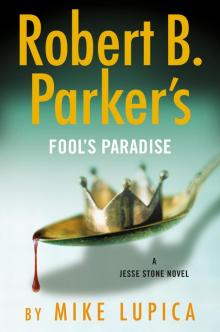 Fool's Paradise
Fool's Paradise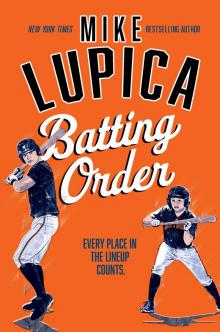 Batting Order
Batting Order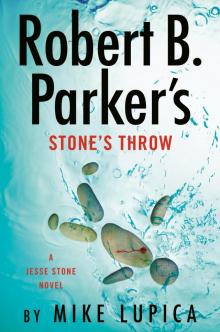 Stone's Throw
Stone's Throw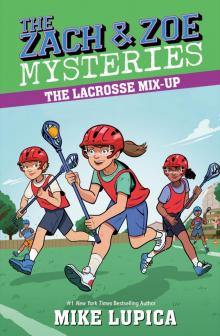 The Lacrosse Mix-Up
The Lacrosse Mix-Up The Hockey Rink Hunt
The Hockey Rink Hunt Payback
Payback Triple Threat
Triple Threat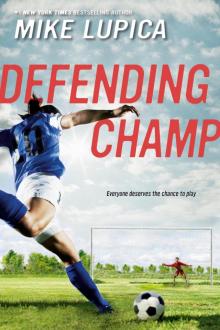 Defending Champ
Defending Champ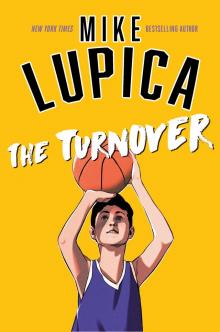 The Turnover
The Turnover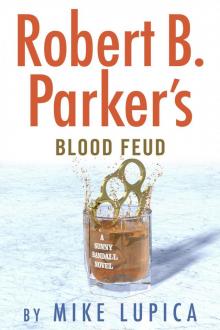 Robert B. Parker's Blood Feud
Robert B. Parker's Blood Feud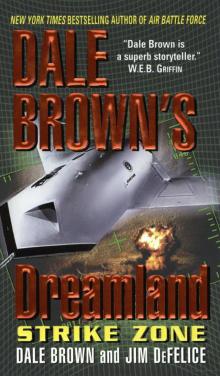 Strike Zone
Strike Zone Hero
Hero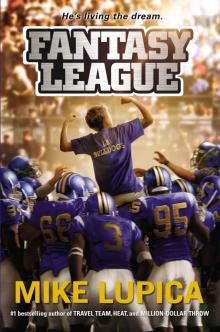 Fantasy League
Fantasy League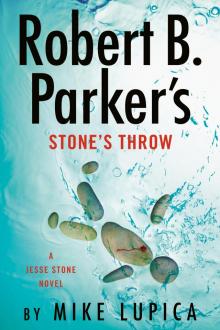 Robert B. Parker's Stone's Throw
Robert B. Parker's Stone's Throw The Big Field
The Big Field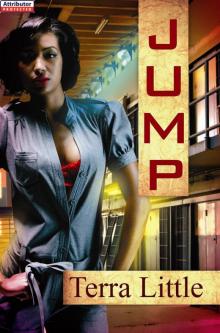 Jump
Jump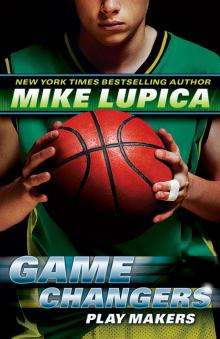 Play Makers
Play Makers The Underdogs
The Underdogs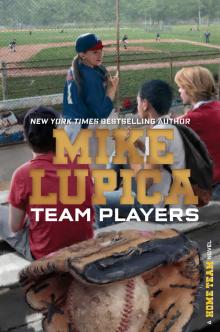 Team Players
Team Players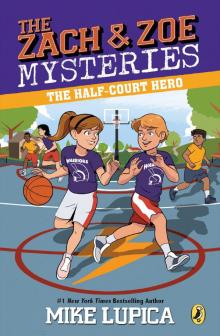 The Half-Court Hero
The Half-Court Hero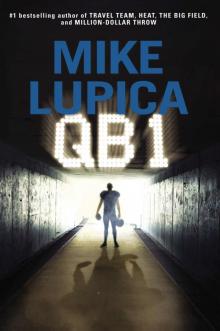 QB 1
QB 1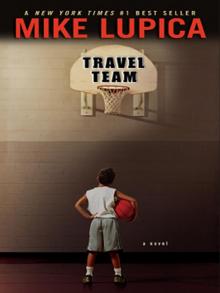 Travel Team
Travel Team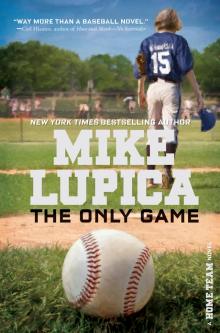 The Only Game
The Only Game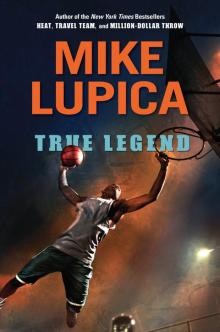 True Legend
True Legend The Batboy
The Batboy Hot Hand
Hot Hand Million-Dollar Throw
Million-Dollar Throw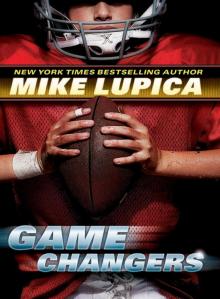 Game Changers
Game Changers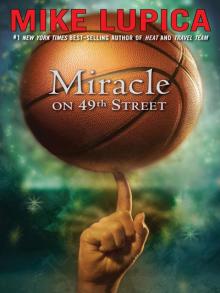 Miracle on 49th Street
Miracle on 49th Street Two-Minute Drill
Two-Minute Drill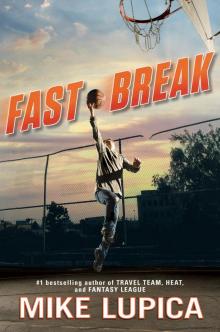 Fast Break
Fast Break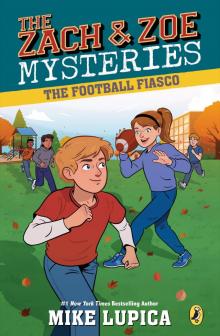 The Football Fiasco
The Football Fiasco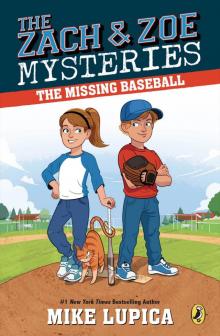 The Missing Baseball
The Missing Baseball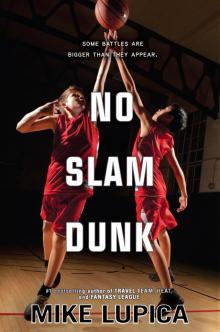 No Slam Dunk
No Slam Dunk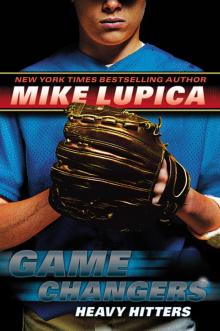 Heavy Hitters
Heavy Hitters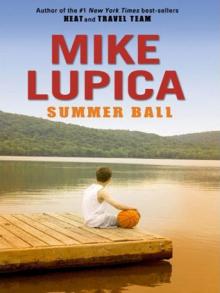 Summer Ball
Summer Ball The Extra Yard
The Extra Yard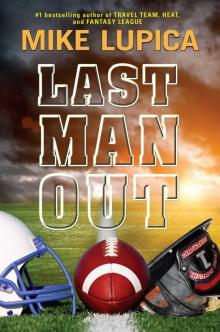 Last Man Out
Last Man Out